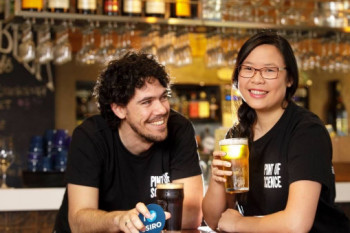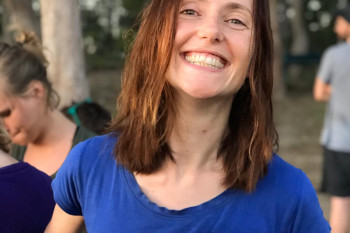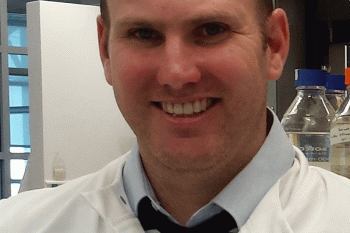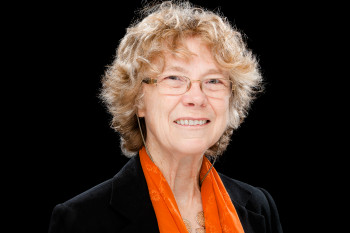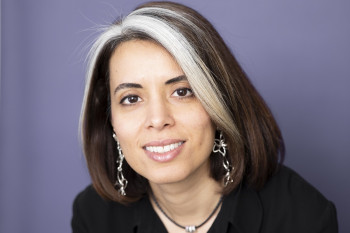© Pint of Science, 2025. All rights reserved.
Bushfire Seeds
Sabrina Davies with Dr Tom Carruthers
The Black Summer of 2019/2020 saw some of the worst bushfires in Australia’s history. The bushfires covered an estimated 18.6 million hectares and reached international news coverage. But how damaging is the fire to the flora of Australia?
PhD student Sabrina Davies from UWA is asking just that question. She’s exploring how the native species of australian plants actually rely on fire for their lifecycle due to a family of chemical compounds in bush fire smoke called “karrikins”. Sabrina also takes us through how trees talk to eachother and x-ray crystallography!
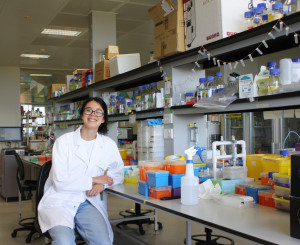
~~
Transcript
Sabrina Davies: There's so many different people who kind of are scientists and it kind of doesn't really matter about your gender, about your ability, about your background, if you're passionate about it, if you can think. if you've got a bit of a mad streak in you, yeah, you count as a scientist, which I think is really cool.
Dr Tom Carruthers: G'day, welcome to another episode of Mug of Science, as part of Pint of Science the online events in 2021. I'm here at the Hackett Cafe at UWA in Perth and I am delighted to have with me Sabrina Davies, who is a PhD candidate or a student at UWA. She is looking at how plants respond or recover from bushfire effects. We're going to get into that very shortly, but first thank you for joining us.
Sabrina: No worries.
Tom: As part of Mug of Science, the first question we have to ask every one of our participants is what's in your Mug?
Sabrina: What's in my mug, I'm a big hot chocolate fan, hot chocolate for me today.
Tom: Hot chocolate, fantastic. Let's find out a little about Sabrina the human. What is it outside of your academic study and research that keeps your mind sane, what do you like?
Sabrina: So I'm trying to pick up electric guitar at the moment. It's so cool to have like a hobby that's very different from science, like using the other side of your brain. I'm pretty novice still, but yeah it's a lot of fun, it's really cool.
Tom: Do you play in a band?
Sabrina: No, still super beginner's level, so I'm not good enough.
Tom: There's beginner bands out there.
Sabrina: That's true, that's true.
Tom: And it's so much fun to play in a band. Yeah, I'm a bass player. Or at least I used to be. Is that something that's been always a passion that you've always wanted to get into, playing music?
Sabrina: I did a bit of keyboard when I was little, and then it was a post-breakup crazy Sabrina moment, I was like, I'm gonna buy myself an electric guitar! And then yeah, just started learning it, two years ago I think.
Tom: Right yeah, very cool. Were there any whether you were always interested in going down this research type path when you were a kid, or was there something else that kind of like triggered you to go now?
Sabrina: Yeah I guess, I always really enjoyed science. You do the thing as a kid where you like watch a movie or you like see something, you're like, I totally want to be that. Like you watch "Ratatouille" and you're like, I want to be a chef, or you watch something else.
Tom: Did you want to be a chef?
Sabrina: I did, at one point yeah. Who wouldn't, a detective, food is awesome... Yeah, science, where'd I get that from, I guess I had some really cool teachers, very inspiring.
Tom: Primary or secondary?
Sabrina: Both. My parents really exposed me to a lot of really cool stuff and yeah there's always like people looking to give you opportunities and sharing cool things, so yeah. I guess I get it from there.
Tom: Were you Perth-based?
Sabrina: No actually, so down south. I was born in Collie, just a tiny little mining town and I moved to Australind for high school, just slightly up north, slightly bigger, and then Perth for uni.
Tom: Right okay, so you did your undergrad here at UWA then, yeah? And that was in...?
Sabrina: Biochemistry and maths, funnily enough.
Tom: Biochemistry and maths, so that's not normally the kind of the mixture that you're in.
Sabrina: Yes, I think there was one other dude who did the combo that I did and we were like "Whoa!" So I guess I picked the biochem because I really enjoyed science really enjoyed that, it's kind of a science which you can take to a lot of places. I did maths because I enjoyed it...semi? I think I did enjoy it in high school. I like that it kind of challenged you, pushed you to really think critically. I was like, I studied for it so hard in Year 12, I don't want to give it up now, and yeah I guess it really did help me think in a critical way, which was good for biochem.
Tom: Yeah definitely and I imagine that some of the statistics work that you have to do, yeah, actually has benefited from you dedicating more of your energy into some of that mathematics. Have you had to enter into much stats yet in your research?
Sabrina: Not heaps actually, my field is pretty low on stats, which is kind of nice because I know some other fields are very very heavy, yeah, but just being able to kind of like use that side of your mind and really work through a problem is cool to have.
Tom: So let's talk about your field. Bushfires and plants generally don't mix too well.
Sabrina: Yeah, well, depends, it depends. So in Australia at least if you've...have you ever driven past a bushfire like a few months later and everything grows back like surprisingly fast? Yeah so it's due to this cool phenomenon, where there's a compound in bushfire smoke that actually like triggers seeds to germinate. Right. So yeah there's this cool thing going on.
Tom: That's specifically in some eucalypts, right?
Sabrina: So it's in like a lot of the Australian native species respond. There's also things like banksia, which need like the heat to crack open seeds and stuff. So yeah, in one way it's very devastating, but in another way it's a very kind of renewing process for the bush, I guess. So yeah, we kind of know that this happens, but we don't understand what's going on, on the smaller biochemical chemical level.
Tom: So biochem, let's talk that. So you're saying that there might be some molecules or that there are some molecules that are in the bushfire smoke which is in a roundabout way, kind of like the breaking down product of the plants themselves. Is that where it comes from? Do the actual plants create the molecule that then needs to be released through fire?
Sabrina: Yeah, so it's like burnt plant material that we get it from, although it's still a little bit of a mystery like yeah how exactly we get it, like where does it exist in plants. Yeah still a lot of unknowns there.
Tom: Do Australian plants respond to burnt plant material that is introduced? Did that question make sense? Can you germinate a seed on an Australian plant from burning an English Oak? Does that work?
Sabrina: Interesting question, yeah, I don't know. So what we do know is that, so this compound, we can kind of like replicate this compound in the lab, right, and it will have effects on plants which we don't expect to be fire-responsive. So we know that, it's really interesting, so maybe it's got, so maybe…
Tom:…some other biochemical purposes or something.
Sabrina:…other pathways, other plant developmental stuff, but yeah I'm not sure exactly about the introduced species versus native species.
Tom: Interesting. So what is the molecule? Is it a complex thing, is it simple?
Sabrina: So it's pretty small. I guess. So it's called 'karrikin', and that's after the Noongar word, karrik, which means smoke. So yeah, the chemical compound. We think, yeah, so the way I like to explain is that imagine it's my birthday right.
Tom: Happy birthday.
Sabrina: Thank you. And I send you an invitation.
Tom: I'm coming.
Sabrina: Sounds good. So yeah it gets shipped, so invite gets sent to you, like on a postie bike or something, you receive the invite, you respond by getting into party mood.
Tom: Party mood activated.
Sabrina: So instead of me sending the signal, it's karrikins, and then instead of the postie bike, it's these things called proteins, so these things inside plant seeds which will kind of get that signal and ship it along. And then you're the plant, so the plant kind of receives that signal and is able to respond in a certain way so the seed will germinate. It could be germination, it could be whatever, those other biochemical responses, some of those.
Tom: Yeah, okay and that kind of shuttling pathway of some sort of signal being transported to where it needs to be, for there to be the action happening, I mean that happens all the way through biology, yeah, not just plants. I mean that's how we do our pharmacology when we're treating people's disease or other things like that. Right, I guess I haven't really thought of plants that way too much, because I think I just look at them as being like they're kind of still things.
Sabrina: Yeah, they kind of just sit there, right.
Tom: But plants are literally moving stuff. Is there much movement inside of plants?
Sabrina: 100 percent. So yeah, if you study plant biology you kind of get to know plants on a real personal level. So many cool things. So have you heard about the whole root system thing, where plants kind of talk to each other?
Tom: I've heard of it. I haven't known what to understand about it.
Sabrina: Yeah, it seems a bit like spacey and out there.
Tom: It is a little bit spacey and out there, but they do kind of share signals?
Sabrina: Yeah, they're communicating between the two.
Tom: Yeah, if they were animals you'd call them hormones, right yeah, or pheromones, even.
Sabrina: So yeah, similar thing, so plant roots can kind of make interactions with fungi, and then yeah, they share this kind of living space, and through that they can network with other plant roots and plant systems.
Tom: And the fungi is essential for that? So without the fungus being there, you don't have a communication pathway between them. So I guess that's your postie bike again. So there's being a signal from yeah, one tree to another tree, the response that a fungus makes. Yeah, cool.
Sabrina: Yeah, it's cool stuff.
Tom: So let's talk a little bit more going back to bushfire. Your specific biochemical research at the moment is, are you studying the postie? Are you studying the plant? Are you studying the molecule?
Sabrina: Yeah, so we're studying the postie, so the thing in the middle. So these things called proteins. Our lab's an X-ray crystallography lab. So it's where we want to figure out the shape of the proteins.
Tom: So X-ray crystallography, I did a little bit of this in my protein work, so where you basically, you literally make a crystal of your purified protein and then you smash it with a gazillion X-rays to figure out what the structure of all that shape is. Are you doing a lot of the crystallography work? Are you also doing the solving, the mathematics?
Sabrina: Yeah, bit of both. Yeah, it's exciting stuff.
Tom: Have you solved many structures yet?
Sabrina: Just the one.
Tom: Just one. Is it published yet?
Sabrina: No, not yet!
Tom: Oh, so we have to keep an eye out! Watching the PDB [protein structure database] for the submission.
Sabrina: That's right, it's so exciting to talk about crystal stuff. Yeah, well I've got another cool analogy for this, I guess. So the way I like to explain crystallography to people is that you think about a fork and you think about its shape, it tells you a lot about how it's supposed to function. So it's got like these three prongs, good for stabbing stuff, therefore it tells you it's like good for stabbing potatoes, stabbing whatever you need. Right so same thing with proteins, if you know its shape, you can figure out how it functions and that's why we're studying it. So figure out the shape, figure out kind of how it's able to pass this karrikin signal inside a plant.
Tom: Right. Are you involved in any kind of like bioengineering aspect of those proteins, or are you purely like observational? Let's look at what the actual native system is.
Sabrina: I guess more native system. Right. I guess like sort of bioengineering in a sense in that like, so it comes from plants but we actually do it in bacteria.
Tom: Okay, so explain to me why that's a good idea.
Sabrina: Yeah, so I guess plants, they take a long time to grow. It's hard to pull proteins out of them. Whereas bacteria are super super fast, you can bulk them up really easily, they're just really easy to work with.
Tom: And that's because bacteria replicate so much quicker and so you're able to you're able to effectively give the bacteria the signal to say, I want you to make lots of the protein that I'm interested in, and then it folds nicely. Does it fold nicely in bacteria? I know that some proteins don't like folding properly, yeah.
Sabrina: This one is pretty happy.
Tom: Yeah okay, well that's good, and then you go through some sort of... you kill off the bacteria, yeah, pull the protein out of your goop that's left over, yeah, is it purely to understand how the system works, or is there another outcome or aspect of it?
Sabrina: I guess so, yeah, in making pure protein, then we can then do a bunch of like functional assays and things with it, so just seeing how it binds to things, seeing how it behaves in I don't know, different conditions or to kind of yeah put together this big story of how this whole signalling pathway works.
Tom: Right, so how far into your PhD are you?
Sabrina: Just started my fourth year. Yeah, exciting! So hopefully my final year.
Tom: Are you writing up already? Is that the question I'm not meant to ask?
Sabrina: Basically, yeah like little bits. Getting there.
Tom: So let's think not now into your past, but think about into the future. Do you have any aspirations for what you think either you might be working continuing to contribute to in about 20 years time, or that the stuff that you've been working on now might be picked up by someone else and continued on in 20 years?
Sabrina: Yeah, I can say a bit about both hopefully. So yeah, in terms of the project, it'd be really really cool to see how, because I feel like sometimes you're doing science especially like fundamental science, and it's like, you do it, you figure it out, but it's like not actually useful until like 10, 20 years later, until somebody finds an application for it. So I think it'd be really cool to see how all this ground-level research is going to play out into like a real world thing. In terms of me in the future, yeah I guess working with kind of like bushfire stuff and plants has really gotten me into kind of environmental climate change research, I think I'd really like to get into. I know, trying to look for jobs at the moment, it's a little bit scary.
Tom: If you're thinking about being a researcher...
Sabrina: It’s a bit overwhelming, but yeah it's cool that there's lots of exciting places to be working for and things to be doing. I just read this cool research article a few weeks ago where people were feeding seaweed to cows, and it like massively cut down their methane.
Tom: I've heard about this thing.
Sabrina: Yeah and I was like, wow, that is mind-blowing.
Tom: And those kinds of innovations are where we can make some really, really big difference, right. Just a simple adjustment of cattle feed suddenly have this fundamental change to the way that a particular industry or whatever might be impacting.
Sabrina: Yeah, for sure.
Tom: And I think that there's so many of those kind of opportunities everywhere.
Sabrina: Yeah, so now it's exciting times.
Tom: Exciting times, definitely. I do want to thank you for your time being part of Mug.
Sabrina: No worries.
Tom: Mug of Science as we've said is part of Pint of Science Australia in 2021 online. We do wrap up these interviews with one final question, and so we ask our interviewees to fill in the blank or finish off this sentence: to me, a scientist is someone who ...
Sabrina: …who can be working anywhere, can be anyone, like there's so many different people who kind of are scientists and it kind of like doesn't really matter about your gender, about your ability, about your background, if you're passionate about it, if you can think, if you've got a bit of a mad streak in you, yeah, you count as a scientist, which I think is really cool, so many different definitions of a scientist.
Tom: Fantastic, scientists can be anyone. Yeah, all right well thank you again for your time.
Sabrina: No worries.
Tom: And thank you for tuning in to Mug of Science. We'll see you at other Pint of Science events all through the weeks in May while the Pint of Science 2021 festival is happening! Thanks for your time, I'm Tom Carruthers this is Mug of Science.
